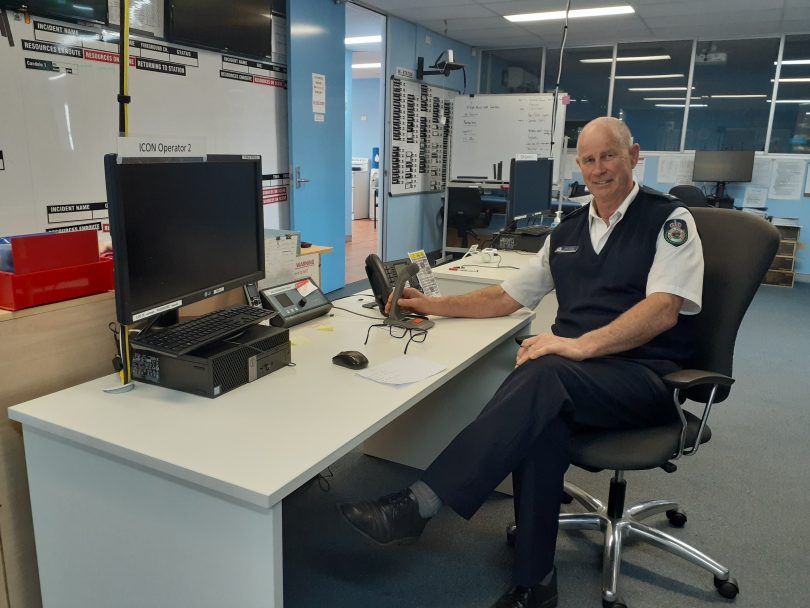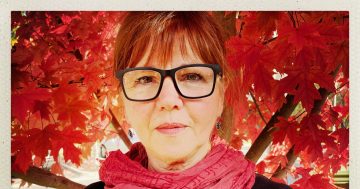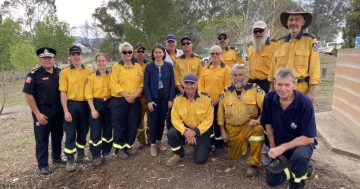
Far South Coast District manager, Superintendent John Cullen, pictured at the Bega Fire Control Centre. Photo: Elka Wood.
Winter is officially over and from 1 September landowners are obliged to apply for a permit to burn on their land.
Right on cue, the Far South Coast saw its first warm, windy day last weekend, with temperatures in the high 20s and a north-westerly reminder that bush fire season is here.
For many of us, it feels too soon after last year’s catastrophic fires to be thinking about being prepared but the NSW Rural Fire Service’s District Manager, Superintendent John Cullen, wants to remind us now is not the time to be complacent.
“Go back over your plan from last year and look at what worked well and how you can fix the things that didn’t work so well,” he said.
“Things like communication. Water supply. Defendable space. Leaving early.”
Mr Cullen says there’s been a larger than average increase in volunteers after last summer’s fires and he and his team have been busy training them while simultaneously adapting to COVID-19 restrictions.
Being in a state of crisis all year following fires and a pandemic has caused exhaustion and made people less likely to rationally prepare for the upcoming season, according to Kathleen McCann of Tanja, who volunteers with her local RFS.
“That warm wind from the north-west is a trigger for all of us, it’s normally a January-February wind,” she says.
“We’re living in a culture of forgetfulness, moving from one crisis to the next, it’s a bit goldfishy.”
The things we’re not talking about include the impacts of farming and mining on the land and the effects of climate change on fire behaviour, Kathleen says.
While she says she’s feeling confident about the coming season because there’s moisture in the soil and the dams are full, Kathleen acknowledges that a month of hot winds would soon see her confidence evaporate.
“Wind dries things more than the sun does, and as our climate changes it’s getting harder to predict when the winds will come,” she says.
Over 60 per cent of the district burnt last year and Mr Cullen says some bushland burnt so severely he’s not sure it will come back, but he says that doesn’t mean we won’t have fires this year.
“We’ve got good soil moisture but the wet also encourages growth, making grassfires more likely to move fast when they start, especially when the grass has been bleached by frosts,” he explains.
When preparing for the upcoming season, a battery-powered radio and headlamp and extra batteries can make a big difference, as well as having a list of things to take if you have to evacuate, Mr Cullen says.
“We’ve learnt from last year that communities that work together and help each other can save whole streets. Now is the time to make a phone tree and check on your vulnerable neighbours, such as the ill or elderly, to see what their plan is in a fire.”
You can make your property easier for RFS firefighters to defend by making sure there’s plenty of room for a truck to get in and around your house, he says.
“Look at your gates: are they wide enough to get a truck through? Do you have vegetation close to your house? Get yourself some defendable space around your assets and make sure that firefighting appliances have the best chance of getting to them,” he advises.
“Access is critical, not just for us but for all emergency services.”
Sven Helland of Bega has taken last year’s fires as a warning and says he has been preparing his rural acreage all winter.
“We are feeling substantially better than this time last year after doing the preparations,” he says. “We’ve still got lots of jobs to be done but we’re not feeling overwhelmed by the list.”
Being unprepared and under stress is the situation we want to avoid, Mr Cullen says, urging us all to turn our fears into action.
“People have had a very stressful time after last year, many of our local brigades have been personally impacted by fire but not being prepared brings stress as well.
“We had a worst-case scenario last year but we don’t want to drop our guard. We’ve got to keep planning and preparing and continue to improve.”
If you’re not sure what you need to do to be ready for fire season, talk to your local brigade and seek advice, Mr Cullen says.
For more information, visit the NSW Rural Fire Service.









